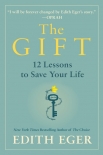Gift : 12 Lessons to Save Your Life Edith Eger (pdf e book reader TXT) 📖

- Author: Edith Eger
Book online «Gift : 12 Lessons to Save Your Life Edith Eger (pdf e book reader TXT) 📖». Author Edith Eger
But surviving Auschwitz was only the first leg of my journey to freedom. For many decades, I remained a prisoner of the past. On the surface, I was doing well, putting my trauma behind me and moving on. I married Béla, the son of a prominent family in Prešov who had been a partisan during the war, fighting the Nazis in the mountain forests of Slovakia. I became a mother, fled the Communists in Europe, immigrated to America, lived on pennies, rose out of poverty, and, in my forties, went to college. I became a high school teacher, and then returned to school for a master’s in educational psychology and a doctorate in clinical psychology. Even late in my graduate training, committed to helping others heal and trusted with some of the toughest cases during my clinical rotations, I was still in hiding—running from the past, denying my grief and trauma, minimizing and pretending, trying to please others and do things perfectly, blaming Béla for my chronic resentment and disappointment, chasing after achievement as though it could make up for all I’d lost.
One day I arrived at the William Beaumont Army Medical Center at Fort Bliss, Texas, where I held a competitive clinical internship, and put on my white coat and name tag: Dr. Eger, Department of Psychiatry. But for a split second the words blurred and it seemed to say, Dr. Eger, Impostor. That’s when I knew I couldn’t support others in healing if I didn’t heal myself.
My therapeutic approach is eclectic and intuitive, a blend of insight- and cognitive-oriented theories and practices. I call it choice therapy, as freedom is fundamentally about choice. While suffering is inevitable and universal, we can always choose how we respond, and I seek to highlight and harness my patients’ power to choose—to effect positive change in their lives.
My work is rooted in four core psychological principles:
First, from Martin Seligman and positive psychology, the concept of “learned helplessness”—that we suffer most when we believe that we have no efficacy in our lives, that nothing we do can improve the outcome. We flourish when we harness “learned optimism”—the strength, resiliency, and ability to create the meaning and direction of our lives.
Second, from cognitive-behavioral therapy, the understanding that our thoughts create our feelings and behavior. To change harmful, dysfunctional, or self-defeating behaviors, we change our thoughts; we replace our negative beliefs with those that serve and support our growth.
Third, from Carl Rogers, one of my most influential mentors, the importance of unconditional positive self-regard. Much of our suffering stems from our misconception that we can’t be loved and genuine—that if we are to earn others’ acceptance and approval, we must deny or hide our true selves. In my work I strive to extend unconditional love to my patients, and to guide them to discover that we become free when we stop wearing masks and fulfilling the roles and expectations others assign us, and start unconditionally loving ourselves.
Finally, I work from the understanding, shared with my beloved mentor, friend, and fellow Auschwitz survivor Viktor Frankl, that our worst experiences can be our best teachers, catalyzing unforeseen discoveries and opening us up to new possibilities and perspectives. Healing, fulfillment, and freedom come from our ability to choose our response to whatever life brings us, and to make meaning and derive purpose from all we experience—and in particular, from our suffering.
Freedom is a lifetime practice—a choice we get to make again and again each day. Ultimately, freedom requires hope, which I define in two ways: the awareness that suffering, however terrible, is temporary; and the curiosity to discover what happens next. Hope allows us to live in the present instead of the past, and to unlock the doors of our mental prisons.
Three-quarters of a century after liberation, I still have nightmares. I suffer flashbacks. Till the day I die, I will grieve the loss of my parents, who never got to see four generations rise from the ashes of their deaths. The horror is still with me. There’s no freedom in minimizing what happened, or in trying to forget.
But remembering and honoring are very different from remaining stuck in guilt, shame, anger, resentment, or fear about the past. I can face the reality of what happened and remember that although I have lost, I’ve never stopped choosing love and hope. For me, the ability to choose, even in the midst of so much suffering and powerlessness, is the true gift that came out of my time in Auschwitz.
It may seem wrong to call anything that came out of the death camps a gift. How could anything good come from hell? The constant fear that I’d be pulled out of the selection line or the barrack at any moment and thrown in the gas chamber, the dark smoke rising from the chimneys, a pervasive reminder of all I’d lost and stood to lose. I had no control over the senseless, excruciating circumstances. But I could focus on what I held in my mind. I could respond, not react. Auschwitz provided the opportunity to discover my inner strength and my power of choice. I learned to rely on parts of myself I would otherwise never have known were there.
We all have this capacity to choose. When nothing helpful or nourishing is coming from the outside, that is precisely the moment when we have the possibility to discover who we really are. It’s not what happens to us that matters most, it’s what we do with our experiences.
When we escape our mental prisons, we not only become free from what has held us back, but





Comments (0)